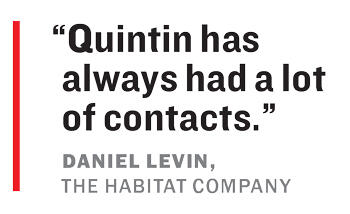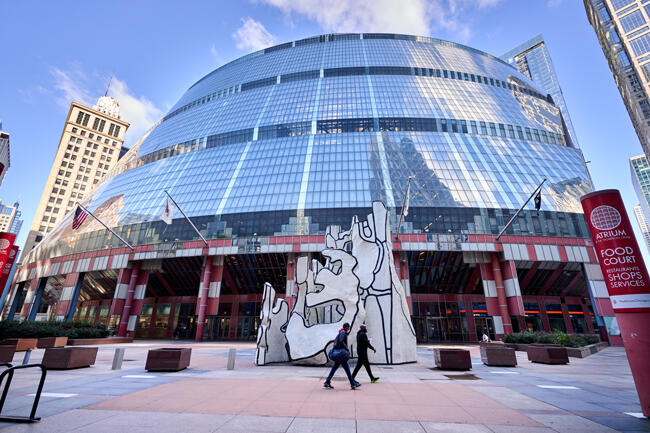At the Rookery building in late September, Quintin Primo III sat at the front of a crowd that included some of Chicago’s biggest developers. They’d come to hear Mayor Lori Lightfoot’s plan to finance the transformation of a stretch of LaSalle Street from a monolith of partially vacant offices into the next hot residential neighborhood.
Even with guests such as John Buck, who retrofitted the Daniel Burnham-designed building, and John O’Donnell, whose two latest office projects at 320 South Canal Street and 110 North Wacker Drive have snagged some of the city’s largest tenants, it was Primo and his partner Mike Reschke who received a mayoral shout-out.
“They really kicked off excitement about the LaSalle Street announcement,” Lightfoot said.
Primo and Reschke have made fast work of clearing a mess of distress on South LaSalle Street that those two O’Donnell skyscrapers helped create by drawing Bank of America to 110 North Wacker and BMO Harris Bank to 320 South Canal. Primo had solved backfilling one of their departures from their longtime South LaSalle offices, reducing the vacancy riddling real estate in Chicago’s historic financial hub.
As TV cameras rolled, Lightfoot credited him and Reschke with spurring demand for more housing in the Loop by persuading Google to buy the dilapidated Thompson Center for $105 million. The tech giant is expanding its Chicago offices into the entire 1.2-million-square-foot former state government building at LaSalle and Randolph streets, with plans to base 3,000 to 5,000 employees there.
With Google’s deal, the state government canceled its plan to move back into the building after renovations. Instead, Primo and Reschke flipped the former BMO building at 115 South LaSalle they’d bought out of distress to the state for a new downtown office location.
Primo, the co-founder of Chicago-based Capri Investment Group, had an inside relationship with a key Google executive that helped seal the deal. Still, he thinks the battle to revitalize the Loop has just begun.
“I don’t know that [Google] will single-handedly save downtown,” he said in an interview with The Real Deal. “A lot has to happen, and it needs to be a public-private partnership between industry and government. And we’re clearly headed in that direction, so the effect of this significant investment will be magnified across the Chicago downtown area.”
Taking notes
Primo was thrilled when Lightfoot requested proposals to convert commercial space on and adjacent to LaSalle into apartments. Developers would receive significant funds from city, state and federal coffers for projects that are designated at least 30 percent affordable.
One of his properties, a part of the former BMO complex soon to be home to the state offices at 111 West Monroe Street, could be a candidate for the subsidies after it played an integral role in bringing Google to the Thompson Center a few blocks to the north. Primo bought a 50 percent stake in the complex of towers, with Reschke buying the other half, pulling the property out of distress. They paid about $120 million for the debt against the building, a discount of more than a third from the original loan issued by Union Bank.
 The partners were then able to sway the state into buying the complex’s LaSalle-facing tower for $75 million to move its offices there instead of going back into the Thompson Center. Now, after keeping the portion of the original BMO Harris Bank complex on Monroe and Clark that’s considered a landmark, they’re considering plans to convert as much as half of that section of property into apartments.
The partners were then able to sway the state into buying the complex’s LaSalle-facing tower for $75 million to move its offices there instead of going back into the Thompson Center. Now, after keeping the portion of the original BMO Harris Bank complex on Monroe and Clark that’s considered a landmark, they’re considering plans to convert as much as half of that section of property into apartments.
It’s quite a coup for Primo, whose rise began as a Chicago money man involved in various forms of lending and advising pensions on their property investments. But he’s not shy about copping to tough losses, including when he first struck out on his own after leaving Citicorp Real Estate in 1988.
Even with an investor group led by the late Marshall Bennett, a Chicago real estate legend credited with inventing the modern industrial park, Q. Primo & Company quickly went under. It raised $30 million in equity for a sale of the Swiss Grand Hotel in the Illinois Center complex on East Wacker Drive after the owner at the time, Swiss Air Nestle, retained his firm. As Primo’s company was seeking Japanese investors to complete the sale, Swiss Air changed its mind and decided to keep full ownership of the property, sinking the deal.
Primo then spent several years “wandering in the desert penniless,” he said. To rebound, he teamed up in 1992 with childhood friend Daryl Carter to launch the original iteration of Capri.
The venture, whose name is a mashup of their own, focused mainly on lending and found success making mezzanine loans to smaller borrowers. Capri caught a big break in 1993, when Connecticut’s state pension fund gave the company $60 million to manage, which the firm placed mostly in real estate, and then upped that amount.
But when the pension system had a leadership shake-up, it pulled out of Capri, forcing the company to diversify its investor base, something it’s had to keep doing over its tenure. The Illinois Teachers Retirement System terminated Capri’s management of a $1 billion real estate portfolio in 2019, citing turnover among Capri staff. Months before that, the Los Angeles County Employees Retirement System redeemed $535 million of assets from Capri’s management. The pension funds declined to comment.
“Most entrepreneurs, universally, experience much more failure than your successes, but the successes get all the attention,” Primo said. “Who would’ve thought, after having assets redeemed as a pension investment adviser, we would land one of the most significant transactions in the city and perhaps the United States?”
Divide and charm
When making a pitch to a prospective client, Carter and Primo gauged who should be the frontman.
“Quintin could not name five NFL teams,” said Carter, who played basketball at the University of Michigan. So when someone’s office has sports memorabilia, it’d be Carter who did most of the talking.
Meanwhile, Primo, who’s steeped in the arts and grew up wanting to be a “millionaire trumpet player,” as he put it on a Harvard podcast, took the lead when an office was dotted with paintings and sculptures.

Thompson Center in Chicago’s Loop
As the son of an Episcopal bishop, Primo moved around, including from Detroit, where he met Carter, to the southern suburbs of Chicago, where he graduated high school. Carter introduced Primo to his future wife, Diane Primo, who heads a public relations firm that counts some of Chicago’s biggest real estate players as clients.
“We don’t talk shop at home,” Primo said of his wife. “She knows too many secrets of the various developers in the city.” They have three sons, the youngest of whom is 16.
“Quintin and I are extremely different,” Carter said. “He was far more strategic and was our visionary, and I was the person that kept the trains running.”
Primo and Carter started with backing from Chestertons, a British real estate company founded in the 1800s whose stake they bought out in 1996. Capri then acquired a company called Washington Capital, which was owned by Chicago’s Jupiter Realty Company, giving it scale in the commercial mortgage debt business. Washington was about four times Capri’s size at the time, according to Carter.
“We went from $1 billion [in assets under management] to $5 billion just like that,” Carter said.
Capri bought the Washington venture for $36 million, grew it and then sold it for $80 million to CharterMac, the lending vehicle led by Related Companies’ founder Stephen Ross.
“Quintin has always had a lot of contacts,” said Daniel Levin, founder of Chicago developer the Habitat Company. He negotiated with Capri on its $84 million purchase, in 2013, of a stake in Habitat’s 47-story, 420-unit riverside Chicago apartment tower, Kingsbury Plaza.
Primo bought Carter out of Capri in the mid-2000s. The company had refocused on buying real estate just before the turn of the millennium, branching out from lending and investment management into owning mainly apartment buildings plus some office and retail assets. The transition culminated with Capri’s $136 million purchase and management of Los Angeles’ Baldwin Hills Crenshaw Plaza mall for a fund that bought the building in 2006.
Multiple challenges followed. As Capri pushed for a redevelopment of the mall that would have added nearly 1,000 apartments to the site, along with a hotel and offices, community members expressed concerns about gentrification. Capri won local approval for redevelopment plans by 2017 , but it never got them off the ground. Investors in the Capri-managed fund that owned the mall were ready to move on. After two sales of Baldwin Hills were scrapped, it was sold last year to California-based Harridge for a loss of $25 million.
“Baldwin Hills was a beast,” said Dawil Sully, the 32-year-old who took over the CEO role this year as Primo transitioned to executive chair. Sully described Primo as being open to feedback and criticism — qualities that are rare in the real estate world.
“He wants to make sure he’s being checked,” said Sully. “He’s not one to point the finger at somebody else.”
Before teaming up with Reschke on the Thompson Center deal and the relocation of the state offices, Primo’s firm worked with him on the office-to-hotel conversion of 208 South LaSalle, contributing toward a $209 million first mortgage construction loan with two other lenders in 2008.
“We’re very close, almost like brothers,” Reschke said. He was initially rebuffed by Primo when he asked to team up on the Thompson Center buy. Primo told him he’d only join later on, if Reschke won the bidding.
Once Reschke had the building in hand, Primo went to work persuading his old friend Mike Tabb, Google’s real estate head, to move into the property.
“It’s a transformative transaction for Chicago,” Reschke said.
He and Primo were the first among Chicago’s real estate elite to exit Lightfoot’s press conference, holding on to each other and laughing as they approached the door.
